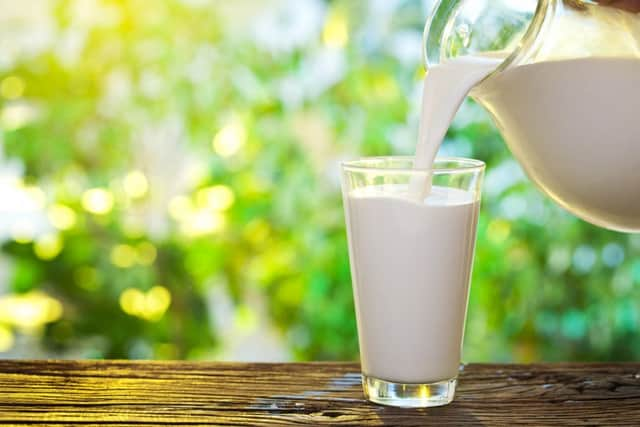Organic meat and milk really are best


They contain 50 per cent more beneficial omega-3 fatty acids than conventional products, according to new research.
Researchers at Newcastle University also found that organic meat had slightly lower concentrations of two saturated fats, myristic and palmitic acid, that are linked to an increased risk of heart disease.
Advertisement
Hide AdAdvertisement
Hide AdThe study, published in the British Journal of Nutrition, also showed that organic milk contains slightly higher concentrations of iron, Vitamin E and some carotenoids, while conventional milk contained 74 per cent more of the essential mineral iodine and slightly more selenium.
Analysing data from around the world, the team reviewed 196 papers on milk and 67 papers on meat and found “clear differences” between organic and conventional milk and meat, especially in terms of fatty acid composition, and the concentrations of certain essential minerals and antioxidants.
The researchers say their findings show a switch to organic meat and milk would go some way towards increasing our intake of nutritionally important fatty acids.
Chris Seal, Professor of Food and Human Nutrition at Newcastle University, said: “Omega-3s are linked to reductions in cardiovascular disease, improved neurological development and function, and better immune function.
Advertisement
Hide AdAdvertisement
Hide Ad“Western European diets are recognised as being too low in these fatty acids and the European Food Safety Authority (EFSA) recommends we should double our intake. But getting enough in our diet is difficult.
“Our study suggests that switching to organic would go some way towards improving intakes of these important nutrients.”
Switching to organic meat and milk would raise omega-3 fat intake without increasing calories and undesirable saturated fat.
For example, half a litre of organic full fat milk - or equivalent fat intake from dairy products - provides an estimated 16 per cent (39 mg) of the recommended, daily intake of very long-chain omega-3, while conventional milk provides 11 per cent (25 mg).
Advertisement
Hide AdAdvertisement
Hide AdThe more desirable fat profiles in organic milk were closely linked to outdoor grazing and low concentrate feeding in dairy diets, as prescribed by organic farming standards.
Professor Carlo Leifert, of Newcastle University, said: “People choose organic milk and meat for three main reasons: improved animal welfare, the positive impacts of organic farming on the environment, and the perceived health benefits.
“But much less is known about impacts on nutritional quality, hence the need for this study.
“Several of these differences stem from organic livestock production and are brought about by differences in production intensity, with outdoor-reared, grass-fed animals producing milk and meat that is consistently higher in desirable fatty acids such as the omega-3s, and lower in fatty acids that can promote heart disease and other chronic diseases.”
Advertisement
Hide AdAdvertisement
Hide AdHe said the study also found 74 per cent more iodine in conventional milk which is important for people in Britain where iodised table salt is not widely available.
Iodine is low in most foods, except seafood, and the World Health Organisation (WHO) recommends Iodine fortification of table salt to address this.
Gillian Butler, co-author and senior lecturer in animal nutrition at Newcastle University, said: “There is a relatively narrow margin between dietary Iodine deficiency and excessive intakes from our diet which can lead to thyrotoxicoxis.
“Optimising iodine intake is therefore challenging, since globally there seems to be as much concern about excessive rather than inadequate intake.”
Advertisement
Hide AdAdvertisement
Hide AdProf Lifert added: “We have shown without doubt there are composition differences between organic and conventional food.
“Taken together, the three studies on crops, meat and milk suggest that a switch to organic fruit, vegetables, meat and dairy products would provide significantly higher amounts of dietary antioxidants and omega-3 fatty acids.
“We need substantially more, well designed studies and surveys before we can accurately estimate composition differences in meat from different farm animals and for many nutritionally important compounds - vitamins, minerals, toxic metal and pesticide residues, as there is currently too little data to make comparisons.
“However, the fact that there are now several mother and child cohort studies linking organic food consumption to positive health impacts shows why it is important to further investigate the impact of the way we produce our food on human health.”